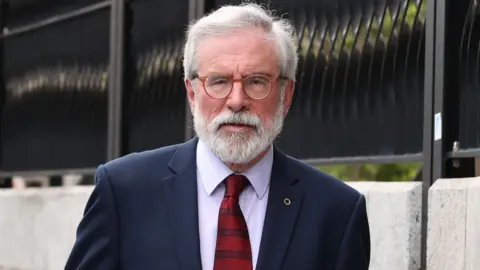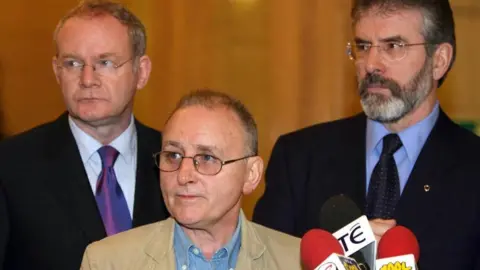Gerry Adams defends actions of IRA in libel trial against BBC
 PA Media
PA MediaGerry Adams has defended the IRA's campaign of violence during the Troubles and declined to name any of its members during his latest evidence at his libel trial against the BBC.
Mr Adams is back on the witness stand at the High Court in Dublin.
He is suing the BBC for defamation over a 2016 story which alleged he gave final approval for the murder of Denis Donaldson, a British agent within Sinn Féin.
He denies any involvement.
Barrister Paul Gallagher SC representing the BBC, resumed his cross-examination of the former Sinn Féin president on Tuesday.
He showed Mr Adams a newspaper interview he had given in 1982 and remarks it contained about Mr Adams' attitude towards IRA violence.
Mr Adams told the barrister: "I have never resiled from the view the IRA campaign was a legitimate response to military occupation.
"I'm not here in this stand resiling from that position."
"It's a historical position now. The IRA have now left. They are no longer there.
"My position remains today what it has been consistently for at least 50 years."
'Fishing expedition'
Mr Adams was also asked if he knew who commanded the IRA in west Belfast in 1972, or any members from that time.
"I'm not going to speculate…a number of people have acknowledged they were members," Mr Adams said.
"You're asking me to go on a fishing expedition.
"At some point we will get around to the Spotlight programme?"
Mr Gallagher reminded the court that Mr Adams was released from internment without trial to attend peace talks with the British government in 1972.
The barrister referred to a book from the time authored by P O'Neill, a pseudonym used by the IRA.
An extract was handed to Mr Adams, in which it was written that a senior IRA member from Belfast had been released from internment to participate.
Mr Gallagher asked Mr Adams if that was him.
Mr Adams replied: "It wasn't me."
'Harsh' remark
Later, the jury was shown a compilation of extracts from TV news reports and documentaries.
One of them was a BBC report from 1987, which featured a clip from a news conference in which Mr Adams spoke about the murder of Charles McIlmurray, whom the IRA claimed was an informer.
In the footage, responding to a reporter's question Mr Adams said: "Mr McIlmurray, like anyone living in west Belfast, knows that the consequences for informing is death."
Mr Adams told the court looking back, his remark was "harsh".
When asked by the BBC's barrister if the comments could have been interpreted as a warning or a threat, Mr Adams replied: "Not at all."
Another of the TV extracts focused on the murder of Jean McConville – who the IRA killed and secretly buried in 1972.
Mr Adams was asked if he had done anything at the time to find out where Mrs McConville was.
He said he "wasn't conscious" of the case then.
Asked what the purpose of "disappearing" informers was, Mr Adams said he "couldn't say" but it was "totally wrong".
'This isn't the Gerry Adams show'
Referring to the video, Mr Adams claimed it sought to "smother" the jury in "selective" footage and that many of those interviewed were "hostile" to the peace process.
Mr Gallagher put it to Mr Adams that he had repeatedly made no apology for IRA actions.
"I supported the right of armed actions, but I was not uncritical of the IRA," said Mr Adams.
At times, the exchanges between Mr Gallagher and Mr Adams, with his shirt sleeves rolled up, were combative.
Mr Gallagher enquired whether Sinn Féin was the IRA's political wing.
Mr Adams responded that the party was an organisation "in its own right" and that it "never" took instructions from the IRA.
He said he had worked to bring about peace.
"I as much as anybody wanted peace and I worked for that with others.
"This isn't the Gerry Adams show even though you might want to turn it into that."
'I'm not on trial here'
Mr Adams and the jury were shown a photo of him wearing a black beret at a funeral in west Belfast in the early 1970s.
It was put to Mr Adams this was "effectively" the IRA's uniform.
He responded: "I don't recognise it as that. It was a republican guard of honour for an old republican.
"I was there as a friend of the deceased."
There was laughter when Mr Adams then remarked that he looked like a character in a TV comedy from the time, Some Mothers Do 'Ave 'Em.
Moments later he added: "Mr Gallagher should remember I'm not on trial here."
The trial has ended for the day and will resume at 10:30 BST on Wednesday, with Mr Adams back giving testimony.
Who is Gerry Adams?
Mr Adams was the president of republican party Sinn Féin from 1983 until 2018.
He served as MP in his native Belfast West from 1983 to 1992 and again from 1997 until 2011 before sitting as a TD (Teachta Dála) in the Dáil (Irish parliament) between 2011 and 2020.
Mr Adams led the Sinn Féin delegation during peace talks that eventually brought an end to the Troubles after the signing of the Good Friday Agreement in 1998.
He was detained in the early 1970s when the government in Northern Ireland introduced internment without trial for those suspected of paramilitary involvement.
Mr Adams has consistently denied being a member of the IRA.
Who was Denis Donaldson?
 PA Media
PA MediaMr Donaldson was once a key figure in Sinn Féin's rise as a political force in Northern Ireland but he was found murdered in 2006 after it emerged he had been a spy.
He was interned without trial for periods in the 1970s.
After the signing of the Good Friday Agreement, Sinn Féin appointed Mr Donaldson as its key administrator in the party's Stormont offices.
In 2005 Mr Donaldson confessed he was a spy for British intelligence for two decades, before disappearing from Belfast.
He was found dead in a small, run down cottage in Glenties, County Donegal.
